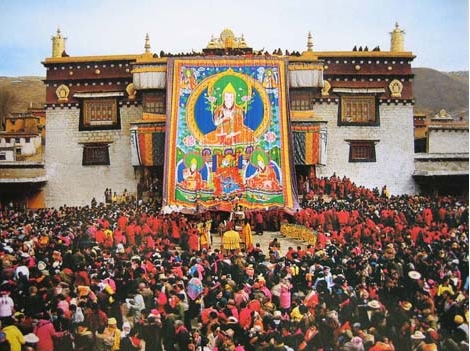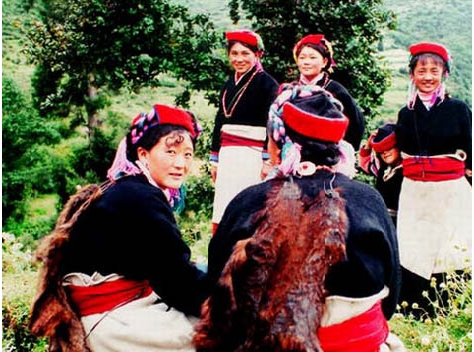

The Monba ethnic group resides mainly in Medog, Nyingchi and Cuona Counties within the Tibet Autonomous Region. "Monba" refers to the people living in a beautiful virgin land. Monba people have their own spoken language but no written form. Most Monba people know Tibetan language in both spoken and written forms quite well. The Monba community believes in Lamaism and in some areas, people still follow primeval shamanic rituals. Water, burying, cremating and celestial burials are some funeral forms for Monba people after death.
Houses beside the Holy Mountain
Because the Monba community lives in a low and warm valley at the south foot of the Himalayan Mountain, their houses are usually made of bars and poles. Materials used for building a house include wood, bamboo, grass and stones from this area. The house is simple but comfortable. Most are two-story houses with a roof made of wood, bamboo or grass. There is balcony outside the house and walls made of plank, stones or bamboo fences surrounding it.
Under the pinnacle of the roof, people would like to live on the second floor and livestock the first floor inside the house. At night, Monba people would lay woolen blanket or animal skins on the floor and sleep with their clothes on.
Hospitality
Besides meat, Monba's food includes rice, maize, millet and buckwheat. Monba people eat rice in a similar way to Han people, and maize and millet are prepared to make porridge. They also like to eat zanba (roasted qingke barley flour), flour, milk powder, buttered tea and pepper.
Monba people are hospitable. The whole family would go out of the village to welcome guests. They cook rice and stew meat for a visitor. Housewives are supposed to stand beside the guest, pouring wine and keeping the cups full during the dinner. At the table, hosts will be pleased if their guests get drunk, as they will take this to mean that their sincerity and warmness are accepted. As the guests leave, hosts will hold cups and see them off out of the village.





